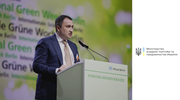News From Agro-Industrial Complex
Even in the conditions of war, Ukraine is among the world's top 5 agricultural exporters, - Mykola Solskyi
The Minister of Agrarian Policy and Food of Ukraine Mr. Mykola Solskyi in his speech at the opening of the International Green Week spoke about the key food challenges and the ways to overcome them.
One of these challenges is the blocking of Ukrainian agricultural exports, both at the beginning of the full-scale war with Russia and today, due to artificial inspections of ships at the Bosporus, which cause turbulence in food markets. As a result, food prices are rising and the food crisis is getting worse.
- Read more
- 916 reads
Grain Initiative: the world loses millions of tons of Ukrainian foodstuffs every month due to Russian sabotage of ship inspections in the Bosporus
17.8 million tons of Ukrainian agricultural products on 659 vessels have been exported from the ports of Odesa, Chornomorsk, and Pivdennyi to 40 countries since August 1, 2022. Since the grain deal was agreed 3 ports had sent 659 ships with food to Africa, Asia, and Europe, and 643 - received new ones for loading with products from Ukrainian farmers.
If the corridor had functioned fully, Ukraine would have exported at least 25-29 million tons of foodstuff to world markets. Thus, since October, Ukrainian ports have been forced to work at half their capacity, the volume of the fleet entering the ports for loading has decreased, and the volume of exports has decreased by 3 million tons per month.
The main reason is the purposeful sabotage of inspections of ships in the Bosporus by the Russian side, which leads to a consistently long queue of more than 100 ships.
- Read more
- 881 reads
Government takes step towards signing EU’s Single Market Programme for EUR 4.2 billion
The Government has approved a draft decree of the President of Ukraine “On the delegation of Ukraine to participate in negotiations with the European Commission on conclusion of an Agreement between Ukraine, on the one hand, and the European Union, on the other hand, on Ukraine’s participation in the European Union’s Single Market Programme (2021-2027)”. The relevant decision was approved at a meeting of the Cabinet of Ministers of Ukraine on January 17, 2023.
- Read more
- 892 reads
The backlog of grain exports from last year's indicator exceeds 10 million tons
The volume of exports of grain and pulses crops from Ukraine in 2022/23 MY as of January 16 amounted to 24.47 million tons, which is 10.6 million tons or 30% less than last season. This is evidenced by the data of the State Customs Service published by the Ministry of Agrarian Policy and Food of Ukraine.
- Read more
- 1107 reads
15% of the corn crop has not yet been harvested in Ukraine
As of January 12, 2023, grain and leguminous crops were harvested on an area of 10.9 million hectares (94%) with a yield of 4.7 t/ha, 50.965 million tons of grain were threshed, including:
- Read more
- 940 reads
Already three African countries are ready to create hubs for storing Ukrainian food
After Senegal Nigeria also offered Ukraine to create a logistics hub for regular supplies of grain and food - Mykola Solskyi
This was stated by the Minister of Agrarian Policy and Food of Ukraine Mr. Mykola Solskyi after the meeting with the Minister of Foreign Affairs of the Federal Republic of Nigeria Mr. Geoffrey Onyeama and the Minister of Agriculture and Rural Development of the Federal Republic of Nigeria Mr. Mohammad Mahmood Abubakar.
- Read more
- 950 reads
Exports to the EU increased by 4.2% according to preliminary results of 2022
ccording to preliminary estimates of the Ministry of Economy, in accordance with the trade balance methodology, exports of goods to the EU countries in 2022 increased by 4.2% compared to 2021 and amounted to about USD 28 billion.
- Read more
- 890 reads
The Government of the Federal Republic of Germany handed over diesel generators to Ukrainian food producers
The Federal Agency for Technical Relief (THW), funded by the German Federal Foreign Office, will hand over more than 700 generators to support the Ukrainian energy system. From this quantity, at least 25 generators will be provided to food producers, in particular, for the production of bread, milk, livestock products, electricity supply to storage warehouses, etc.
- Read more
- 991 reads
Ministry of Economy: Consumer inflation on the outcomes of 2022 was 26.6% - significantly below forecasts
In December 2022, consumer inflation remained at the level of the previous month - 0.7% per month. Annual inflation amounted to 26.6%. This figure was significantly lower than the figures predicted in the first half of the year. The Ministry of Economy of Ukraine told what put pressure on prices and gave a forecast for the coming months.
- Read more
- 867 reads
Ukraine and Senegal intensify the cooperation in agriculture
As a part of the visit of the Ukrainian delegation to Africa, the Minister of Agrarian Policy and Food of Ukraine Mr. Mykola Solskyi on January 9, 2023 had a meeting with the Minister of Agriculture, Rural Infrastructure and Food Sovereignty of the Republic of Senegal Mr. Aly Ngouille Ndiaye.
The parties discussed the prospects of relations between Ukraine and Senegal and the development of cooperation in the agricultural sector.
- Read more
- 994 reads

















